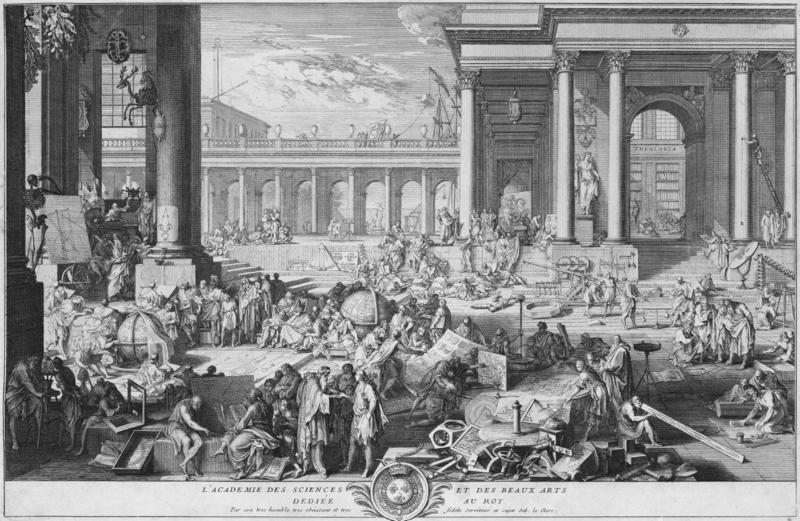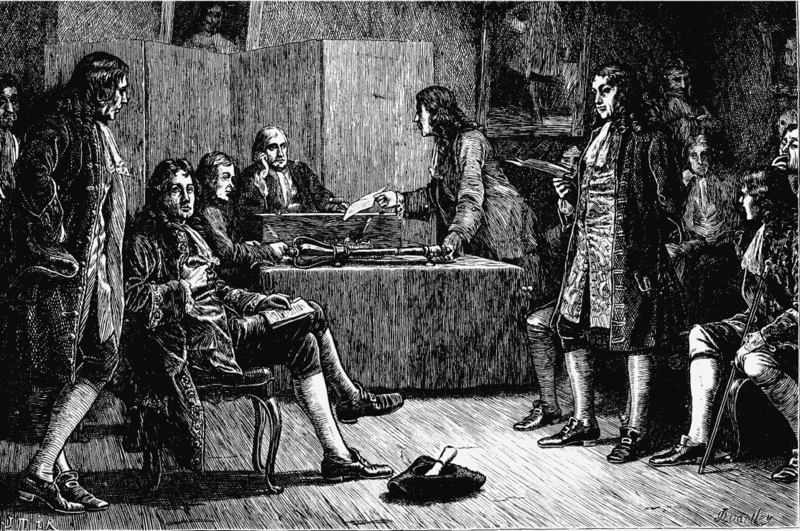The Common Notion: Science and Consensus in the Seventeenth Century
New ERC Project at the Maison Française d’Oxford
As of January 2023, the Maison Française d’Oxford (MFO) co-hosts a five-year project on seventeenth-century natural philosophy entitled The Common Notion: Science and Consensus in the Seventeenth Century (NOTCOM), funded by an ERC Advanced Grant. Before assuming my role as the Principal Investigator of ERC project, I worked as a senior researcher at the MFO (2019-2022) with colleagues in Oxford and France on the framework for this project, which includes collaboration with the Oxford Centre for Intellectual History, the Oxford Centre for the History of Science, Medicine, and Technology, and other Oxford-based research centres. I hope this project will help to create and consolidate strong bilateral relations between British and French intellectual historians and historians of science, and in particular expand the already strong institutional relations between the CNRS and Oxford. The project will include a team of postgraduate and postdoctoral researchers, recruited in France or in the UK, and co-ordinate lectures, workshops, and conferences in Oxford, Lyon, and elsewhere, in collaboration with colleagues on both sides of the English Channel.

Naissance de l'académie 1666
NOTCOM is, in a nutshell, a historical study of what is today referred to as ‘scientific consensus’. In its crudest formulation, a general consensus argument infers the truth of a proposition from the universality of its acceptance, i.e. it holds that since everyone deems something to be true, it must be true. The inference is, from a logical standpoint, transparently invalid. Nonetheless, consensus arguments are constantly used in public debates about science and scientific truth. Indeed, ‘scientific consensus’ is one of the arguments most widely used by scientists to persuade policymakers and counter science scepticism. But on what peculiar forces do such arguments rely? Many disciplines have addressed the question: social epistemologists have explored the conditions of scientific group knowledge; rhetoricians have pondered how to efficiently communicate consensus; sociologists of science have quantified both consensus itself and public adherence to it; social psychologists have elucidated the impact of consensus among scientists through cultural and group identification factors. None of these approaches, however, engaged with the history of scientific consensus.
The fundamental intuition of NOTCOM is that this is a mistake because consensus formation is by nature historically structured. It represents those shared assumptions that in any given scientific debate are regarded as non-controversial. Such consensus comes about through complex temporal and historical patterns. It evolves differently from one discipline to the other. It develops and changes, sometimes quite radically. But it is not only the object of scientific consensus—i.e. what scientists agree upon—that evolves. Scientific consensus itself — what such agreement amounts to, how it is grounded, who is eligible to take part in its formulation, and what value it has — has a complex history. Understanding scientific consensus, therefore, requires historical study. Based on this intuition, NOTCOM undertakes to write a part of that history and explore its contemporary potential, namely the history of scientific consensus in the seventeenth century.

Academie des sciences
The first research theme (RT1) is concerned with the epistemology of consensus and collective science. The beginnings of modern philosophy are routinely depicted as a break with tradition and authority, as a moment when the individual mind took charge of its own powers, getting rid of idols and scholastic prejudices, and adopting new criteria of certainty and truth, either innate or based on direct observation and experience. One corollary of that well-rehearsed narrative is the rejection of universal consent as a criterion of truth. When restricted to the canonical thinkers, a history of early modern philosophy is thus a narrative about how epistemologies based on authority, consensus, and common notions were replaced by epistemologies based on criteria of self-evidence or empirical observation. And yet, when looking beyond the traditional rationalist-empiricist divide built upon this narrative, arguments from general agreement or universal consent begin to resurface everywhere. RT1 explores these early modern epistemological models of consensus and universal consent from the viewpoint of a concept whose broader signification has been largely ignored, namely so-called “common notions” (koinai ennoiai), also described as “prolepses,” “preconceptions,” “anticipations,” or “presumptions.” Common notions are both etymologically and conceptually at the root of two other notions whose foundational role in early modern natural science is widely acknowledged, namely axioms and hypotheses.
The second research theme (RT2) focuses on methods of collective science as they were conceived and applied within seventeenth-century communities of natural philosophy. The settings of the early modern practice of natural philosophy spanned university auditoriums, anatomical theatres and informal gatherings in private homes. Learned societies and scientific communities have, however, proven a particularly rich topic for studying such practices and their underlying methods. They have been the object of a steady stream of learned commentary over the last century. These societies, real and projected, large and small, embraced different norms and principles of collective scientific investigation. The intellectual space of the Royal Society, for example, with its practices of collective experiment and gentlemanly values of integrity and reliability, has been extensively studied. Leibniz’s collaborative scientific ethos of moderation was present as the background of his plans for various academies. No matter which norms or principles such communities embraced, they did so while making basic gestures of collective agreement. Scientific societies, as all societies, have a corporate structure based on common commitment to shared principles of decision-making. Surprisingly little attention has, however, been paid to what natural philosophers themselves had to say about the collective nature of their knowledge. And yet there is an abundance of writings to explore. By focusing on such texts, NOTCOM gives the historical agents a voice in justifying the methods of collective inquiry they adopted.
The third research theme (RT3) is concerned with issues regarding public dissemination and public participation in collective science. The original Baconian programme argued not only that useful science was experimental but also that experimental science was useful. Both convictions carried over into most such programs. For example, a 1663 manifesto for the Compagnie des Sciences et des Arts emphasised that all members should “strive mutually with all [their] strength to contribute to matters pertaining to happiness in this life.” And yet the utility of modern natural philosophy was not a given. Patrons and the broader public had to be persuaded. So natural philosophy became increasingly present within society; scientific spectacles proliferated; anatomical theatres were built all over Europe; public experiments were conducted at courts, in colleges, coffee shops, and private homes. The strategies adopted by natural philosophers to navigate this new public interface took different forms. If the secretive ‘Solomon’s House’ in Bacon’s New Atlantis was a frequently adopted model, audiences were nonetheless included as participant observers and public demonstrations of science were compatible with an epistemology of common experience. In the absence of physical audiences, rhetorical strategies were devised to create the impression of ‘virtual witnessing’. Through RT3, NOTCOM demonstrates that the models of common notions studied in RT1 were central to public dissemination strategies in ways that have been previously overlooked.

Royal Society Meeting: Crane Street
The fourth research theme (RT4) focuses on topicality and contemporary relevance. A survey conducted in 2013 examining 11,944 peer-reviewed climate papers written by some 29,000 climate scientists over 20 years, concluded that more than 97% agreed on the reality of anthropogenic climate change. Just prior to the Bonn Climate Summit in 2017, 15.364 scientists signed a warning about the dire ecological state of the planet. The quantification of scientific consensus is one of the scientific community’s principal weapons in combating science scepticism. Yet on either side of the debate over climate change, scientific consensus is mostly considered a proxy for scientific knowledge, designed to induce ‘gateway beliefs’ in a public unequipped to evaluate the underlying science. This conflicts with a substantial body of research into the ‘closure mechanisms’ of scientific controversies. Constructivist orientations in the sociology of science have offered a rich theoretical context for exploring the essential role played by consensus formation in science. These studies have, however, also left consensus with a tainted reputation, as shaped by ideology, culture, funding, or politics. Today, science sceptics routinely seize upon constructivist arguments to rebrand fringe hypotheses as bold scientific innovation and manufacture counter-consensus arguments. The academic response has ranged from theoretical back-pedalling to ‘new materialist’ attempts to establish scientific authority on fresh ontological foundations. And yet the problem remains rhetorical at its core. The challenge, as Leibniz already noted, is to find ways to make the public a ‘a kind of partner in discovery’. To successfully communicate science to the public, however, citizens must be offered both reliable and accessible insight into the actual processes of scientific consensus formation. For this, NOTCOM suggests drawing on narrative resources specific for the historiography of philosophy and science. In a reflexive mode, RT4 thus explores the rhetorical potentials of NOTCOM itself.
The project is conducted within the general framework of INSHS, the humanities and social sciences wing of the CNRS, but shared between two CNRS research units: (1) The Institut d’histoire des représentations et des idées dans les modernités (IHRIM) at the ENS in Lyon, a mixed research unit dedicated to modern history of ideas; (2) The Maison Française d’Oxford (MFO), a French research unit associated with the University of Oxford that will function as un administrative hub and facilitate collaboration with the Oxford Centre for the History of Science, Medicine, and Technology (OCHSMT) and the Oxford Centre for Intellectual History(OCIH). This institutional framework across national borders forms a pioneering research environment tailor-made for the project.
Mogens Lærke is the Directeur de recherche, CNRS, IHRIM, Lyon / Senior Researcher, MFO, Oxford. A more detailed description of the ERC project ‘The Common Notion’ can be found on the website of the MFO: https://mfo.web.ox.ac.uk/article/new-erc-project-maison-francaise-doxford-common-notion-science-and-consensus-seventeenth


